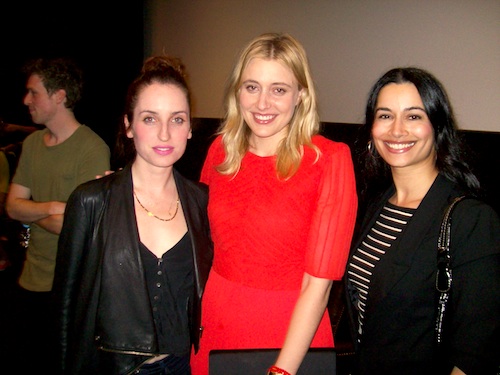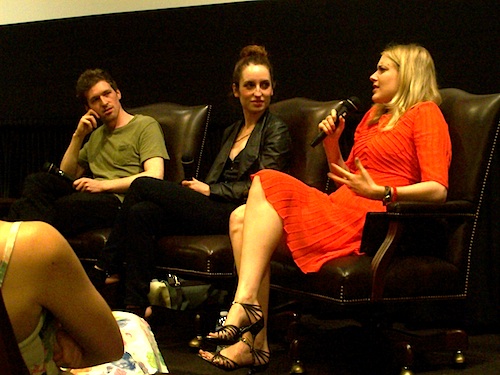
By Govindini Murty. The turn toward female-centered comedies seems to be accelerating in the indie cinema as much as in mainstream Hollywood. In the wake of Bridesmaids and HBO’s Girls, the new comedy Lola Versus, starring indie favorite Greta Gerwig, is the latest risque, R-rated project to explore the imperfect reality of women’s lives. The film screened this spring at the Tribeca Film Festival and is currently playing in theaters.
Greta Gerwig plays 29-year old Lola, a graduate student working on her Ph.D. in literature who thinks her life is perfect until she is dumped by her fiance just a few weeks before their wedding. Lola is devastated by the break-up – and flummoxed at the prospect of turning 30 as a single in New York. She swerves into a series of comic misadventures: hooking up with the wrong men, drinking and partying too hard, and neglecting her work, as she tries to figure out what to do with her life. Aiding and abetting her are her friends, the zany aspiring actress Alice (Zoe Lister-Jones, also the film’s screenwriter) and a quirky musician named Henry (Hamish Linklater). Lola’s parents are played in nice turns by Debra Winger and Bill Pullman.
Gerwig shines as Lola, bringing a quirky charm and intelligence to what might otherwise be a standard rom-com role. It’s easy to see why directors Whit Stillman (in Damsels in Distress), Woody Allen (in From Rome With Love) and mumblecore favorite Mark Duplass have all worked with her.
I had the chance recently to chat with Greta Gerwig, as well as with director Daryl Wein and screenwriter Zoe Lister-Jones, at a screening of Lola Versus at USC Cinema School in LA. Interestingly enough, all three of them emphasized the importance of making a film that celebrated a woman’s point of view. As Wein said in the Q & A after the screening:
“We realized that we really wanted to do a female oriented film just because we weren’t really seeing female-driven stories about single women, especially at this age. … Even me as a man, I wanted to see a portrait of a woman I could relate with.”
I asked them what influenced them as filmmakers in this regard, and Gerwig, Wein, and Lister-Jones cited films from two distinct eras: the 1970s/‘80s (with a smattering of ‘90s indie cinema) and classic Hollywood in the 1930s and ‘40s.
Greta Gerwig answered:
“I’m a cinephile – I love movies … I like movies that have a really strong writer, I love Howard Hawks’ movies, I love Preston Sturges movies, Billy Wilder, Ernst Lubitsch. Those are the movies that I love because they’re almost “plays as films.” They have this quality of – you can almost see the dialogue when people speak it. [That’s] really important, and I think that that’s still what I love, and I’m so grateful that I got to work with someone like Whit Stillman who is in that tradition, who’s really erudite and literary. … And I also love Woody Allen, I mean he’s kind of a person I think of all the time. But those filmmakers – that’s what I always look for, what I always hope for, and when I see echoes of that in things I just get so excited.”
Zoe Lister-Jones added:
“I love John Hughes, I love Pretty in Pink … and obviously Woody Allen … Daryl and I as filmmakers are very inspired by him, he’s just sort of the OG and no-one can ever top him. I like Robert Altman, I think his movies are really cool, and Hal Hartley, I grew up really being into Hal Hartley in the ‘90s. Music’s really important to me and he always had really good music – and you know, complex characters who were dark and dry.”
As for Daryl Wein, he recounted: “I grew up on classic guys like Scorsese and Spielberg and Kubrick. Big fan of Hitchcock’s films, and I love some of Hal Ashby’s movies, and of course Woody Allen is a big influence.”
Of course, many of these filmmakers are notable for creating witty, dialogue-centered movies that took a fresh approach to depicting women’s lives. And as women gain greater power in the film industry, it seems we may have a new era upon us of character-driven women’s comedies and dramas. Greta Gerwig, for example, who studied at Barnard to be a playwright before turning to acting, has written and directed an indie women-centered comedy that will be unveiled later this year. Gerwig in particular spoke with great passion at the screening about what she saw as a coming revolution for women in the movies.
“This is a huge moment, I really think, for women in film. I think it is as big as anything that has happened for women. I think people look at television and movies to figure out who they are and how they live and what’s important, and for the first time in a big way women are being shown to women as they are. I think it’s unprecedented, and if I get to participate in it even a little bit it’s the most exciting thing I can think of. I went to women’s college so I get really excited about it. But it’s true … If women aren’t represented in media the way they are, it’s like they don’t exist. I just think it’s such a huge moment. … and I hope it keeps going because I feel seen and heard in a big way as a woman…”
To which Wein piped up: “Greta for President. First female president!”

After the Q & A, I chatted further with Gerwig, Wein, and Lister-Jones about the issue of women’s representation in the film industry. We discussed the absurd fact that three or four men are still cast for every one woman in film and TV, and Wein indicated his own commitment to making more movies that featured women. I told them about the work of Geena Davis’s Institute on Gender in Media, and all three of them expressed how glad they were to hear about her work. I also told Gerwig that I agreed with her that we’re entering an important new era for women in film, and that the success of Twilight and The Hunger Games had been crucial in this regard. Wein and Lister-Jones added that they thought that Bridesmaids had also played a major role in showing that women-centered comedies could make money.
In all, I think we have some very provocative and interesting times ahead of us as more and more women get both in front of and behind the camera.
Posted on June 25th, 2012 at 11:47pm.